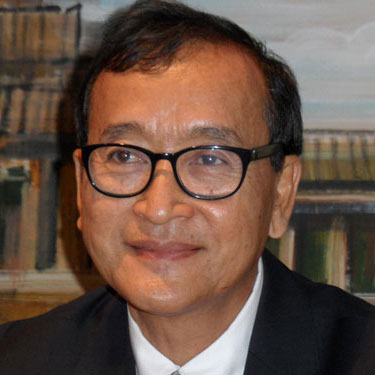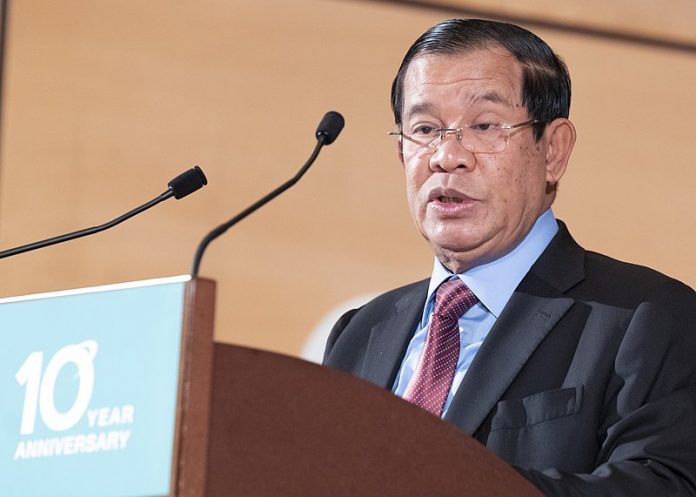For a leader whose hands are stained in blood, power means impunity.
Cambodian Prime Minister Hun Sen’s claims that he will stay in power for the rest of his life betray his fears and weaknesses.
He has good reason to be afraid: the dictators Nicolae Ceaușescu, Saddam Hussein et Muammar Gaddafi, having lost power, were executed in 1989, 2006 and 2011 respectively.
Political scientists have studied the likely outcomes for Hun Sen. According to the Australian academic Lee Morgenbesser, only a handful of such personalist dictators have avoided death, jail or exile after losing power. One of those outcomes, Morgenbesser writes, is Hun Sen’s most likely fate.
So Hun Sen’s plan is to avoid independent justice once he has to give up power by handing over to one of his sons. But in the twenty-first century, trying to set up a ruling family dynasty is anachronistic to say the least. In fact, Hun Sen’s imaginary dynasty is no more than a denial of the dangers that the prime minister faces.
Hun Sen would be mad to think that Cambodia can follow the example of North Korea. He would be even madder to imagine that at the end of his political life, all his allies and potential rivals will fear him enough to roll out the red carpet for his son, and manipulate fake elections as they have done for his father.
And if there were genuine, free and fair elections, the idea that people would vote to keep power in the hands of the country’s most-hated family is to depart into the realms of science fiction. Transparency International classes Cambodia as one of the most corrupt countries in the world. No-one wants the country to be run as the private property of a single family.
Hun Sen responds to these stubborn facts by loudly repeating that his eldest son Hun Manet will replace him to ensure he keeps impunity for the rest of his life. Like most monologues, the speaker is simply trying to convince themself. In Hun Sen’s case, he is also trying to threaten all those who might oppose his succession plan.
But the only path to safety for Hun Sen is through democratic defeat. The only path to freedom for Cambodia is for him to allow genuine elections to determine the country’s future.
Record breaker
Hun Sen has boasted of his “exceptional talents” which have allowed him to stay in power for 35 years. It will be no great surprise if in coming years he seeks to become the world’s oldest serving prime minister.
Even if he is officially 68 this year, his exact age remains a mystery as he has changed his date of birth several times. It was normal for rural Cambodian families to lower the age of their children by a few years so that they might be able to enter primary school when they were late in being able to do so.
Hun Sen is proud to recall that in 1985, he was about 33 years old when he became the youngest prime minister in the world. He takes this distinction as a mark of his political genius. In fact, Hun Sen was installed by a foreign army of occupation.
The real youthful political geniuses are democratically elected. Sebastian Kurz was first elected chancellor of Austria in 2017 aged 31. Jacinda Ardern was elected prime minister of New Zealand in 2017 aged 37. Emmanuel Macron was elected president of France in 2017 aged 39. Sanna Marin was elected prime minister of Finland in 2019 at the age of 34. They have the legitimacy which Hun Sen will always lack.
If Hun Sen wants Hun Manet to benefit from the same aura of “precocity” and “political genius” which he ascribes to himself, then he should hand over quickly. Otherwise Hun Manet risks being seen as a perpetual leader in waiting, whiling away the time while his father decides his fate.
The quandary for Hun Sen is that he does not dare to carry out this plan. He has no idea when the least risky time to do it will arrive and so mistakes his desires for realities. To make matters worse, Hun Manet seems to lack the charismatic personality, the cynical cunning, the glibness, the experience, or the megalomania to want to hold power at any price like his father.
There is no way that Hun Manet, aged 42, can be considered as too young to take over, and, given his exceptional political longevity and his advanced physical age, there is no way that Hun Sen can pretend that he is too young to retire now, especially after his recent decision to force many younger military commanders to retire because he didn’t trust their loyalty any longer. Naturally, he does not dare to state the truth: he is too afraid to stand down in current circumstances as the assurance of impunity which is now his principal preoccupation seems more and more distant.
But democratically defeated leaders have a much better prognosis than dictators who have been overthrown. Democracy is not Hun Sen’s enemy, but the antidote to his fears.
The views and opinions expressed in this article are those of the author.

Sam Rainsy, Cambodia’s finance minister from 1993 to 1994, is the co-founder and acting leader of the opposition Cambodia National Rescue Party (CNRP).


